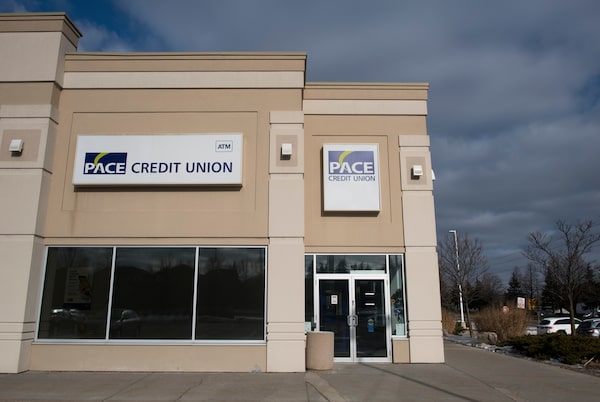
The PACE Savings and Credit Union branch in Mississauga, Ont. on March 12, 2019.Fred Lum/The Globe and Mail
Ontario’s financial regulator and PACE Savings and Credit Union have reached a tentative $40-million settlement with about 700 investors who suffered steep losses on products sold to them through a subsidiary of the credit union.
The investors, many of whom are at or near retirement age, lost a combined $49-million and claimed they were misled about the riskiness of their investments. They bought preferred shares in two companies promoted by investment advisers at Pace Securities Corp., an investment dealer owned by the credit union that has since been wound up.
Under the terms of the settlement, which still requires court approval, investors could receive 70 per cent or more of the principal they invested in compensation, though the precise way the settlement would be distributed is still to be negotiated. Lawyers from Paliare Roland Rosenberg Rothstein LLP who were appointed by an Ontario court to represent the investors have recommended the settlement. The investors had sought as much as $60-million in damages.
If approved, the $40-million settlement will be paid jointly by PACE Credit Union and a trio of insurers for the companies, various executives and investment advisers involved in selling the products to investors. Those insurers are AIG Insurance Co. of Canada, Axis Reinsurance Co. and Liberty Mutual. One term of the settlement is that the precise contribution to be made by PACE and the insurers will be kept confidential, and the sums owed by each are redacted in court filings.
In recent months, PACE’s financial condition deteriorated sharply, and the settlement with investors could weigh heavily on its future viability. Though PACE chief executive officer David Finnie has said the credit union is stable and viable, FSRA CEO Mark White also acknowledged at PACE’s last annual meeting of shareholders that PACE “simply doesn’t have the financial capital” to pay tens of millions of dollars in compensation on its own to investors who claimed they were misled.
Mr. Finnie could not immediately be reached for comment.
PACE has been under administration by the Financial Services Regulatory Authority, which is Ontario’s financial regulator, since 2018 after former executives were dismissed over allegations of fraud and self-dealing. “Given ongoing concerns” about PACE’s financial condition, FSRA has guaranteed the credit union’s contribution to the settlement announced Thursday should PACE be unable to pay it, according to the settlement agreement.
“PACE continues to have liquid financial resources far in excess of such payment obligation,” said FSRA spokesperson Judy Pfeifer, in an written statement. The regulator “supports the settlement” even though it “will reduce PACE’s equity,” she said, as “it will help reduce the uncertainty for all PACE members.”
“We think the [settlement] number is actually a very good number,” said Max Starnino, a lawyer at Paliare Roland who represents the investors, in an e-mail. “This speaks to the importance of this case to all stakeholders, and particularly the investors, and we are very pleased to have been able to achieve this result.”
The preferred shares that tumbled in value last year were in PACE Financial Ltd. and First Hamilton Holdings Inc., a pair of investment vehicles run by Joseph Thomson, who was CEO of PACE Securities. They were investment products with characteristics of both stocks and bonds that paid generous dividends of up to 7 per cent annually to everyday investors, some of whom were also members of PACE Credit Union.
Mr. Thomson’s investment team borrowed against the proceeds from the share sales to increase the size of its investments in high-yield corporate bonds, which plunged in value after the onset of the coronavirus pandemic. Independent reports commissioned by PACE Securities classified the shares as medium-risk products, but the Investment Industry Regulatory Organization of Canada describes them as “high-risk” in a disciplinary action against Mr. Thomson and another of the dealer’s former executives.
Several investors who spoke to The Globe and Mail said they were seeking a low-risk way to earn interest on savings and retirement nest eggs, and never understood the true risk of the preferred shares.
Editor’s note: An earlier version of this story misattributed a quote about PACE's financial condition to the credit union's CEO, David Finnie. In fact, it was FSRA CEO Mark White who made the comment.
Your time is valuable. Have the Top Business Headlines newsletter conveniently delivered to your inbox in the morning or evening. Sign up today.
 James Bradshaw
James Bradshaw